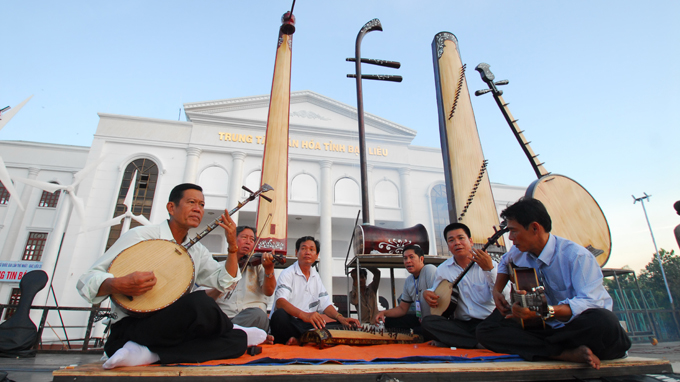The first-ever national festival honoring “Don Ca Tai Tu” (southern traditional music), which was recognized by the UNESCO as an Intangible Cultural Heritage of Humanity late last year, kicked off in southern Vietnam on Thursday and will go on until next Tuesday.
Themed “Don Ca Tai Tu - The Love of Southern Land and People,” the festival in Bac Lieu Province attracts some 350 artists and artisans from 21 southern provinces, and boasts 21 main activities, 14 of which are intended to honor artists and artisans credited with preserving and contributing to the time-honored art form.
Bac Lieu is considered one of the “Don Ca Tai Tu” cradles.
The opening will take place at the recently-inaugurated Hung Vuong Square in the provincial capital Bac Lieu City’s Ward 1 at 8:00 pm on Friday.
The event will close at Ho Nam Ecotourism Complex at 2 Tran Quang Dieu Street, Ward 1, Bac Lieu City at 8:00 pm on April 29.
However, activities such as an ornamental creature exhibit, a tourism-trade fair, a southern cuisine fest, and a caravan of old cars already got started yesterday and will run until April 29.
The festival also boasts exchanges between “Don Ca Tai Tu” artisans and enthusiasts from many southern provinces and cities, exhibits of traditional musical instruments, and performances of classic “Don Ca Tai Tu” works.
Tourists will also be instructed by the artists how to play simple “Don Ca Tai Tu” tunes during the performances and exchanges at Ho Nam Ecotourism Complex.
Other prominent activities include a meeting between local businesspeople and artists, the launch of the province’s Fund for Preserving and Developing Don Ca Tai Tu, and a workshop on the conservation and development of the long-standing art.
Representatives from some 20 international organizations, including diplomatic, cultural and educational agencies, as well as more than 300 reporters from 72 local news agencies have flocked to attend and cover the festival.
The event’s organizer and provincial authorities have set up several hotline numbers so that locals and tourists can report rip-offs, scams, robberies, and food safety issues during the festival.
Deputy director of the provincial Public Security Department, director and deputy director of the provincial Industry and Trade Department have also publicize their cellphone numbers, at 0913.892.282, 0913.892.383 and 0913.892.658.
The festival, held for the first time to celebrate the UNESCO recognition and further promote and preserve “Don Ca Tai Tu,” has been enthusiastically embraced by locals and tourists alike.
Many visitors even arrived in Bac Lieu days before the beginning of the festival to enjoy the sparkling decorations and colored lighting systems on several major streets.
Local school students, except for preschoolers and those preparing for university entrance exams, are also allowed to take some days off between April 24 and 29 on this occasion.
A number of journalists and tourists have so far reported overload at hotels throughout the province.
Le Thi Ai Nam, vice chair of the provincial People’s Committee, explained that as Bac Lieu is still a poor province, there are limited hotels and rooms for rent.
She added that her committee will require the province’s Department of Finance to keep an eye on rip-offs and unreasonable hotel rate hikes.
“Don Ca Tai Tu” was recognized as a UNESCO Intangible Cultural Heritage of Humanity in December 2013.
Regarded as one of the country’s main chamber music genres, it stemmed from court music in the central city of Hue and folk music of the southern region.
The genre has been developing since the 19th century, changing along with local taste. It thrived in the early 20th century and remains crucial to the country’s traditional culture.
The time-honored genre is typically performed at festivals, death anniversary rites, and celebrations by farmer artists.
Instrumentalists and singers express their feelings by improvising based on 20 principal songs and 72 classical ones. The art has been handed down orally through generations.
Seven other genres of traditional Vietnamese music, including “Nha nhac Hue” (Vietnamese royal court music in central Thua Thien-Hue Province), “Quan Ho” (Bac Ninh folk love duets in northern Bac Ninh and Bac Giang Provinces) and “Ca Tru” (northern ceremonial singing), were also recognized by the UNESCO as intangible cultural heritages in the past.
Like us on Facebook or follow us on Twitter to get the latest news about Vietnam!




















































